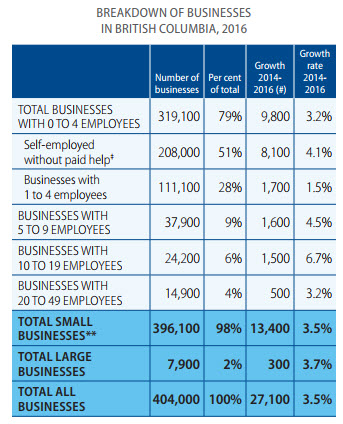There are approximately 400,000 small businesses in British Columbia. Every single one of them will face conflict, of one type or another. Yes, conflict will come. Conflict will most definitely come. If you are a small business owner, why not build your business’ conflict competency now, in preparation for the conflicts that will definitely come your way?
Small business and conflict
The British Columbia government defines small business as 50 or less employees. The federal Canadian government defines small business as 100 or less. As a share of total employment, BC small businesses make up 44% of all employment in the province.
As this BC Stats chart shows, the vast majority of BC small businesses are solo operators and/or businesses with only a handful of employees.
Over the last 15 years, I’ve helped hundreds of small businesses deal with their conflict issues. With respect to small business and conflict, I’ve observed that:
When you are self-employed, “soft skills” such as effective communications and conflict management are rarely optional. You are your business. You are the face and personality of your business, good and bad.
As your business adds employees, getting those employees on the same page, and working together, demands an additional set of skills, oriented to communications, collaboration, and team dynamics.
As your business continues to grow, odds are that you’ll find it harder and harder to have a close relationship with all your employees; e.g., the way you did when your business was just you and a handful of employees. To offset that relationship distance, empowering your employees to make constructive choices on their own, to demonstrate conflict competency from within, becomes your challenge. A healthy workplace culture is vital. “Culture is what people do when no one is looking.” (Herb Kelleher, former CEO, Southwest Airlines)
Three strategies to build and scale conflict competency in your small business
Recognizing that your needs change as your business grows, here are three complementary steps/strategies that will help you build conflict competency, and gain you a strategic advantage in the process:
1. Increase individual self-awareness
The most cost-effective way to resolve conflict is to improve one’s self-awareness. I look in the mirror, all the time, when I find myself in conflict. I don’t always like what I see, yet, a bit of self-reflection usually leads me to make better choices.
There are numerous self-assessment instruments which will help you become more familiar with yourself. Myers-Briggs Type Indicator, Thomas Kilmann Conflict Mode, DISC Profile… I use/prefer the Conflict Dynamics Profile ® assessment instrument. It helps individuals increase awareness of their ‘hot buttons’ and conflict behaviours.
If you want to work better with others, and to riff on philosophers from time immemorial, remember: collaboration begins with you.
2. Develop conflict competent teams
“A team is a small number of people with complementary skills who are committed to a common purpose, performance goals, and approach for which they hold themselves mutually responsible.” (Source: The Wisdom of Teams, Katzenbach and Smith).
Teams typically encounter both task conflict and relationship conflict. Task conflict concerns disagreements among team players about the work they are performing. It evolves from the natural differences of ideas and opinions that occur among people. Relationship conflict centres more on who is to blame than on how to solve a problem.
Well managed task conflict can improve team performance. Conflict competent teams are able to lessen the chances that task conflict morphing into relationship conflict. A focus on the task, along with a strong sense of humility, makes for an ideal team player.
Team assessments, agreements, coaching, training… All can help further team learning and development.
3. Apply a systems lens to conflict
As your business grows, so does its complexity; people, process, tools, etc.
I’ll adopt good concepts wherever I find them. One concept I learned from collaborative law is “it takes a system to change a system”. Address complexity with complexity.
Another framework concept I adhere to is process “guides and enablers” (a concept I learned from process engineers, in my IT systems consulting days). Respectful workplace policies and procedures, embedding constructive conflict into employee hiring, retention and development, and offering a continuum of solution options, be it workplace conflict management and/or collaborative problem-solving, all further the conflict competency cause.
What are you doing, to get ready for conflict?
[Ben Ziegler is a Conflict Management Specialist serving SMEs, nonprofits and local governments. Contact Ben.]


Speak Your Mind